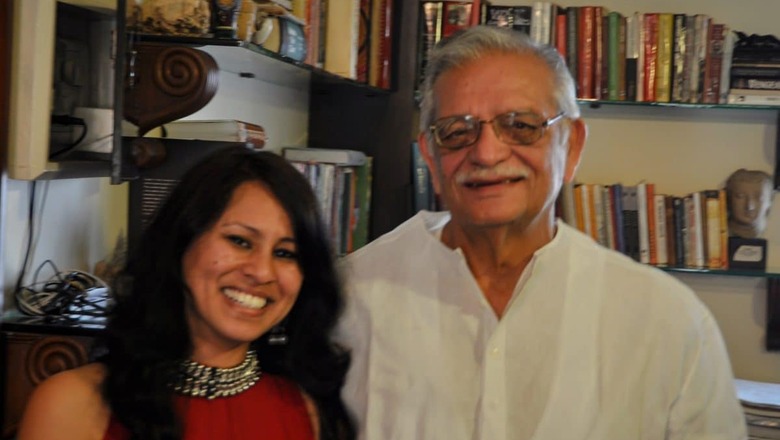
views
Shailja Chandra’s first book, The Moonsmith Gulzar, was released in November 2021 and has received widespread acclaim. The book explores the philosophical, emotional, and existential themes in Gulzar’s writings and has been praised by Gulzar himself as the best work on his works so far. While her love and adulation towards Gulzar is fathomless, her journey into that world has been a surreal experience for Shailja as she has deftly juggled between being a sustainability consultant and following her passion for broadcasting. She has interviewed countless artists, musicians, filmmakers, literature icons, and authors, including Gulzar, Shekhar Kapur, and Rekha Bhardwaj. Shailja also runs a fortnightly podcast called Mukhtasar Si Baat with Shailja, which was featured on Gaana’s Top 10 Podcasts (English) for several weeks after its launch.
In an exclusive interview with News18, Shailja Chandra talked about her book Moonsmith Gulzar, the impact that the legendary poet had on her, her thoughts on the current slew of writers, poets and lyricists in the entertainment industry and more.
Tell us something about ‘The Moonsmith Gulzar’. The themes it explores and what to look forward to while picking it up from the bookshelves?
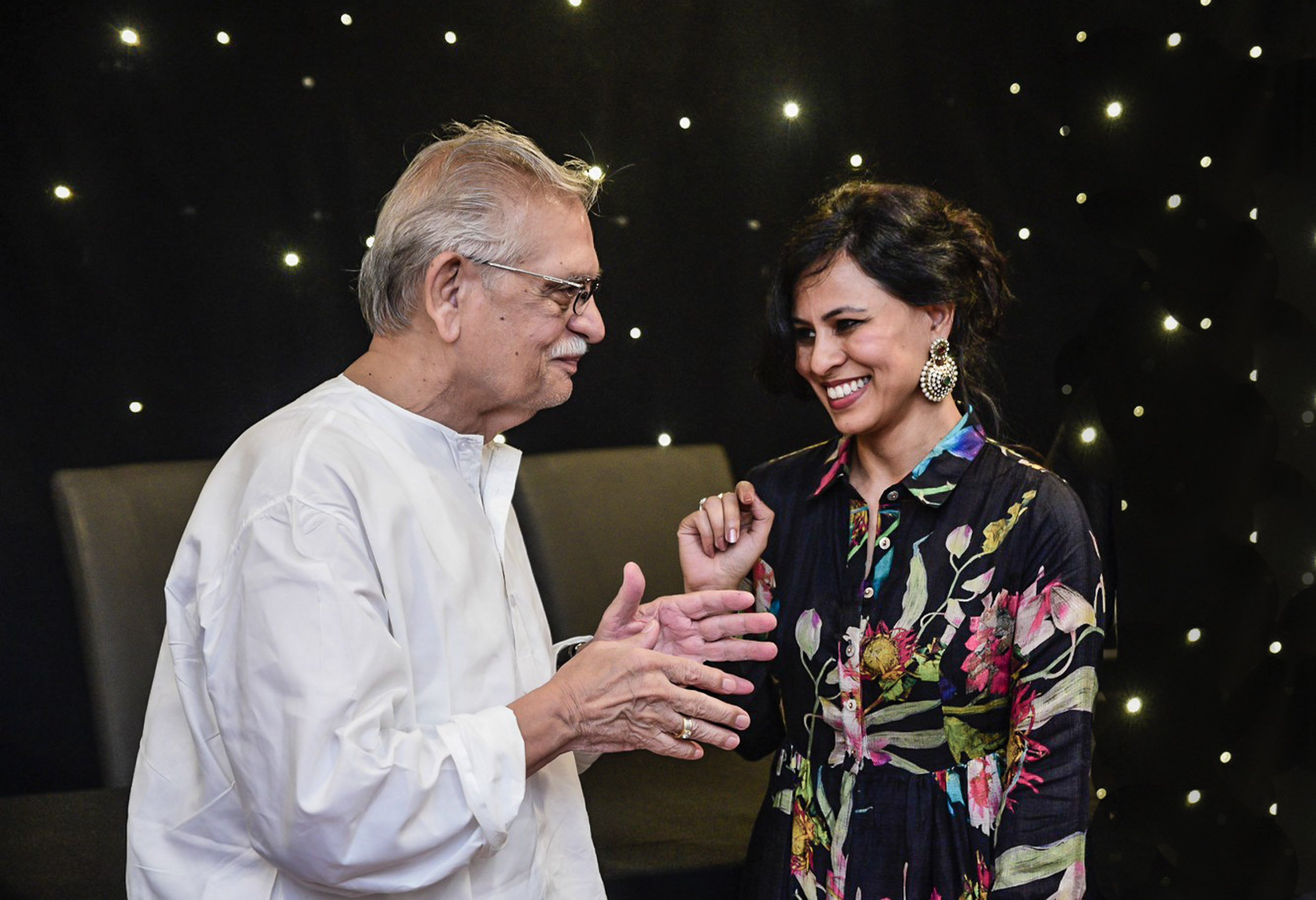
A lot actually. Firstly, beautiful poetry. If you are a fan of Gulzar. If you really wear him like a tabeez, that’s the book for you. Because it really precipitates a lot of his work and specifically his work around the key questions of life and those preoccupations of the human mind which can never be solved. Whether we are talking about love, God or relationships. Questions that will continue to be with us till the end of humanity. I’ve categorised and anthologized literary works of Gulzar in 9 chapters. So the way it is put together is also quite interesting. It’s not been done before. The structuring of the book was quite an inspiration for me as well. I think that’s one of the major things, the way it structured and the way people can very easily access his voice or work on any particular theme.
What’s your earliest recollection of coming across Gulzar’s work? How did your initiation towards Gulzar started and where did it lead you?
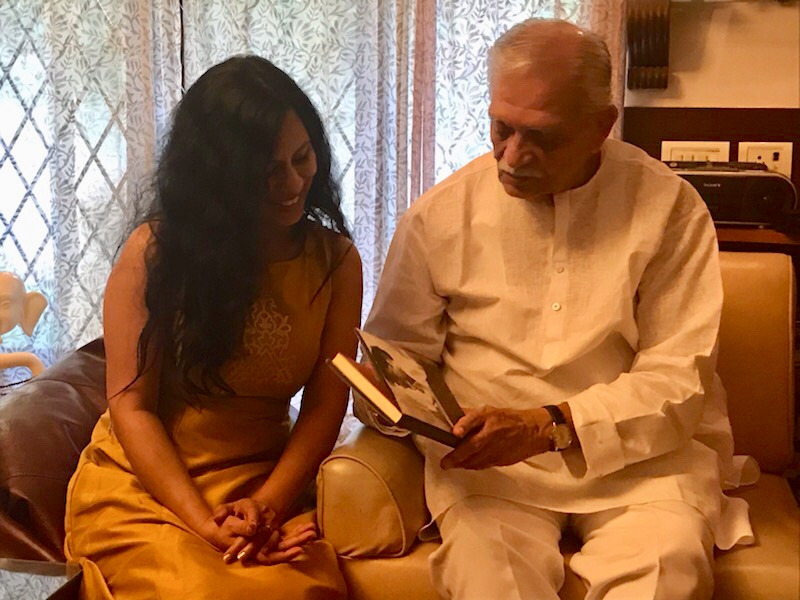
I can write another book on that (laughs). But I have to go back to my teenage years or probably before that. It would be mostly through Hindi films and music and Vividh Bharti. I should give credit to that. So just my ears and my heart got tuned to his songs differently than others. It was like – this is something different. I must pay attention to the lyrics. Usually, you go with the flow of the music – you’re more tuned to the melody side of it. But my heart could tell this is something different and slowly I realised I am able to pick him apart from other songs. That this is Gulzar. Sometimes I would be correct and sometimes I wouldn’t be. But if a song was really hitting my heart and striking a chord, I’d wish it to be Gulzar. And most times it would be. So that’s how it started. But one very early memory of me really connecting to the soul of his words was when I was in IIT Roorkee in the hostel and I remember this one afternoon where I was just looking out to the courtyard. It was a boring afternoon and on the radio was the song ‘Tere Bina Zindagi Se Koi Shikhwa Toh Nahi’. And I’ve written an article about this afternoon, which is not part of the book but it got published in an online journal in 2016 where I wrote about that experience of longing without having experienced longing for someone. As if he sort of made me become the longing that was always there in me, dormant and then it triggered. So that’s one of my early memories and that’s when my love for Gulzar started. When I started doing Radio broadcasting in Sydney, one of my dreams was to interview him and bring him on the radio. So that’s how I started to pursue an interview with him, which happened in 2012 and that first meeting with him was actually the seed of the book in a way. Because the interview also explored many questions of life. We focused a lot on literature and life. We didn’t go too much into movies or lyrics that day.And when I came back, we aired that interview and from there the whole idea of the book started to simmer in my head. So that’s how it all started.
At any given point of time, were you nervous that you are writing a book on him, whether he’ll like what you churn out or whether you have been able to do justice to his work?
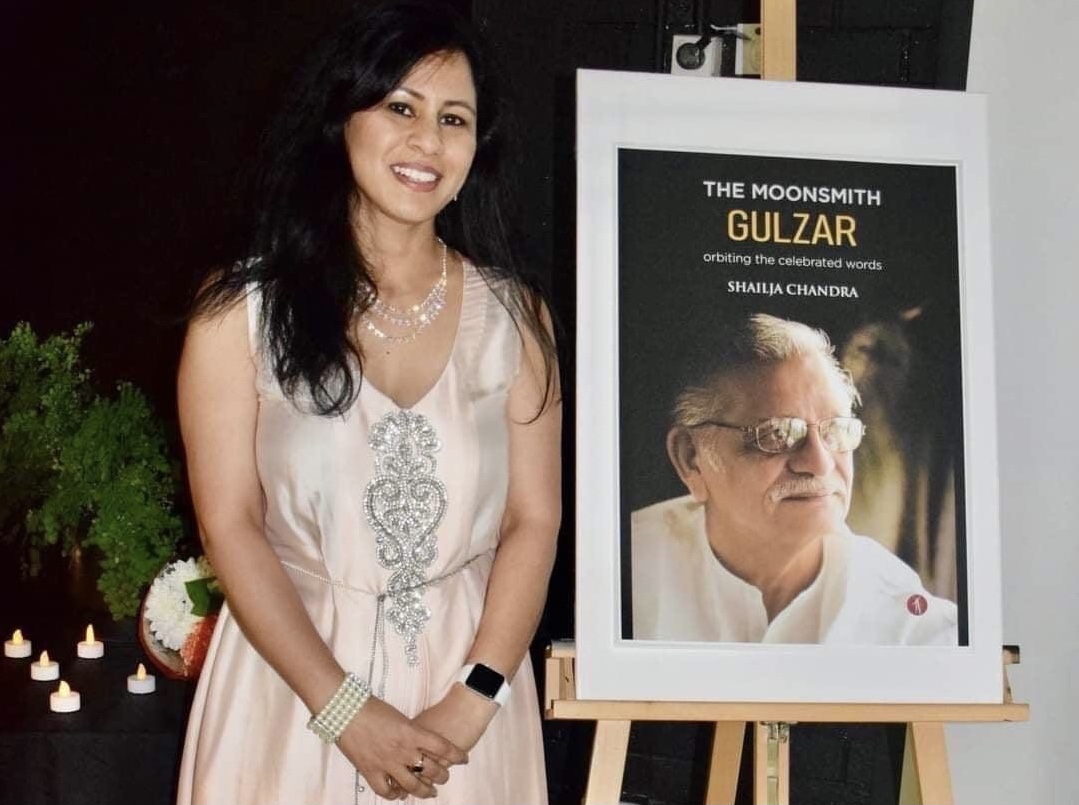
Yep. All the time. And till now I sometimes wake up and wonder about the whole journey!(laughs). As to how could I write about him! And I have throughout the process quite categorically said that this is not a critique of his work, or I am not trying to unravel the enigma that he is. But my attempt is to give a vantage point to the nuances that are embodied in his works. So if you look at the cover of my book, you’ll see the name Moonsmith Gulzar but there is also a subtitle which says ‘orbiting the celebrated words’. So I realised I was like a little satellite orbiting him and taking pictures from different angles and positions. And that’s just me as a satellite. So in a different time, If I had orbited again, I might see different aspects of his work. And if you are orbiting him as a satellite, you will see different things. So that’s why I saw him as a celestial body that I am orbiting at some point in time. That’s why the title and the sub-title.
How will you describe Gulzar or his work? What are some of the things that he employs in his writing that other writers don’t? What are some of your observations about his writing? And how has it evolved over the years?
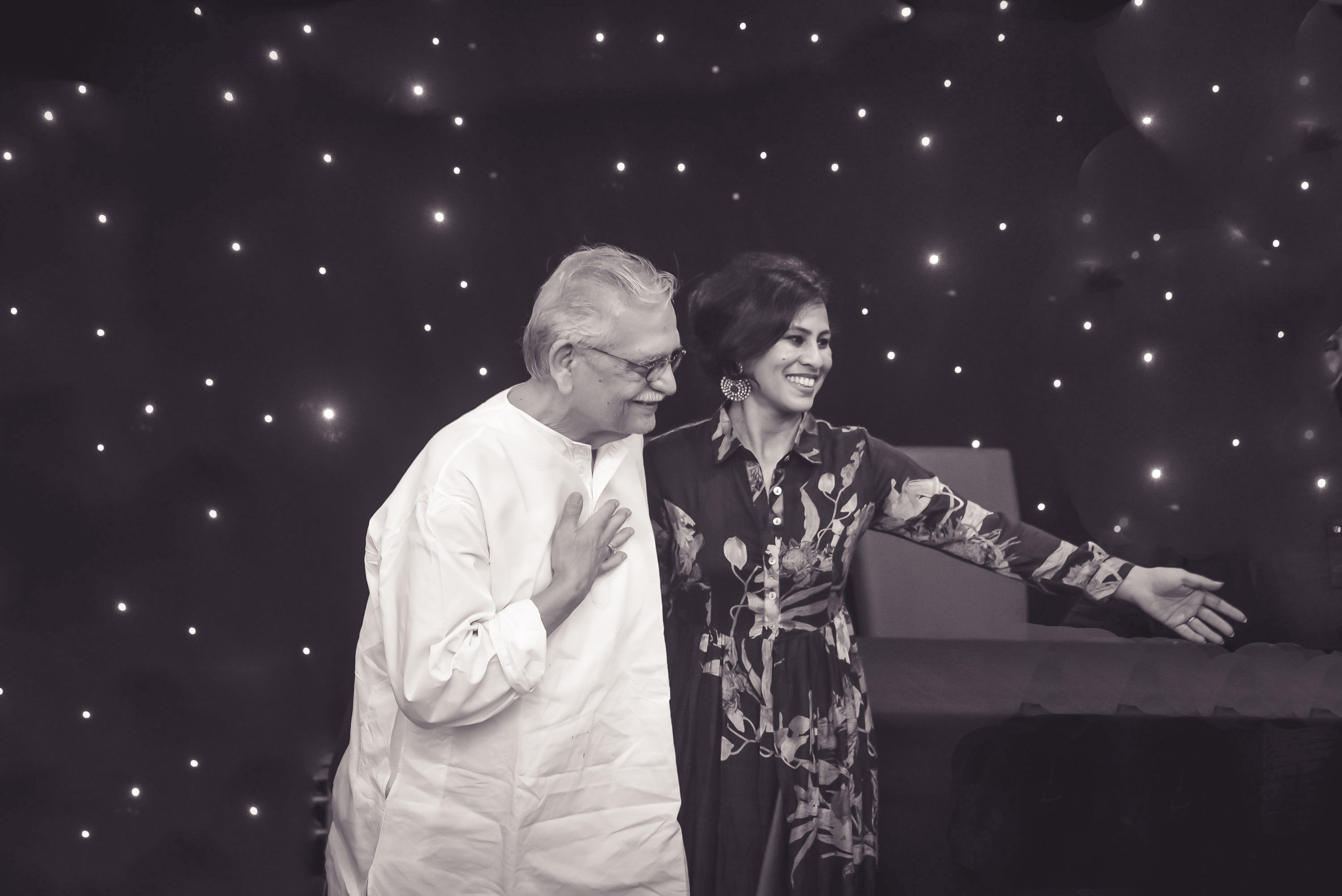
It’s good you said some of the things. Because the book has all of what I could distill. It’s all in the book. But if I had to pick some of the things, I would say that there is a certain vulnerability or authenticity in his voice when he talks about soil and society. So that’s one of the nine topics featuring Gulzar’s writings on soil and society. And when he writes about that, I chose to focus on the fact that it doesn’t sound like or read like he is standing on an ivory tower and sermonising. It comes from a place of very vulnerable sharing of his own pain and struggles. And that gives him a certain authenticity but also the authority to talk about the struggles of the environment. So there is a sense of writing through your pain. For example, he writes MoD pe dekhaa hai wo buDhaa sa aik peD kabhii, Meraa waaqif hai, bahot saalo’n se mai’n use jaantaa hoo’n……Subah se kaat rahe’n hai’n committee wale, MoD tak jaane kii himmat nahi’n hoti mujhko…
And then he describes that the tree has given ‘kairiyaan’ which are raw mangoes and so much more and now today the municipality people are chopping it off. So there is a kind of rawness his voice has. He is not saying ‘Don’t chop trees because it’s not good for the environment’. The voice of preachiness is not there. It’s more about feeling the pain at a very personal level, coming from a place of very raw vulnerability. That gives his voice this very, very raw verve and authenticity.
Gulzar saab once said that as a poet he writes intelligently but he is not an intellectual. So to what extent will you agree with him on this statement and why?
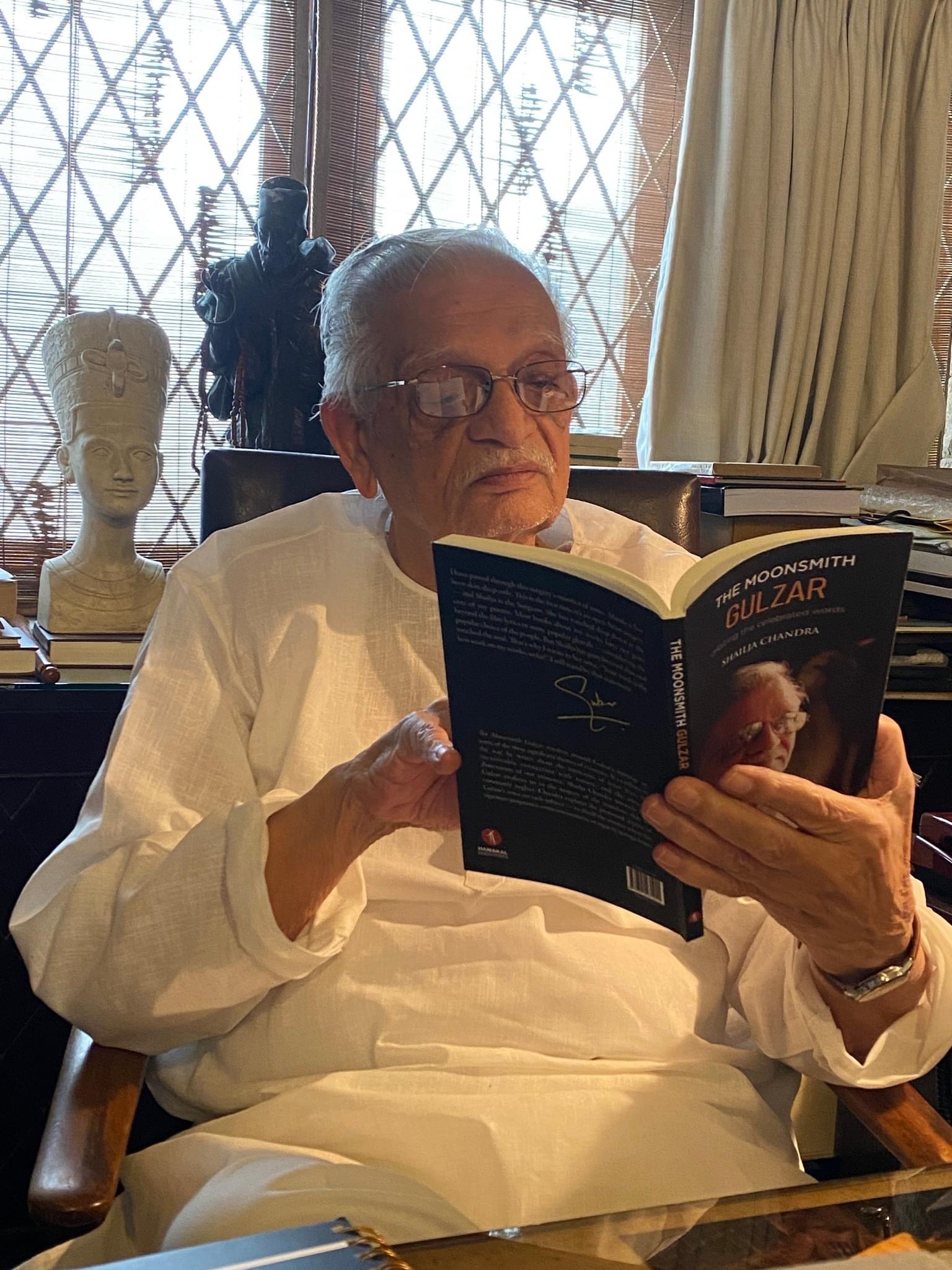
I think he is one of those rare poets who can balance the tenderness of a poet, the intellectual side of a scientist and far-sightedness of a philosopher as well. In a way, I agree with him. But I just want to add that it’s a beautiful balance that is there in his voice and that is very rare to see.
And if you compare him with other stalwarts like Javed Akhtar, what are some of the differences you find in terms of writing or structure or expressions?
Firstly, I find that most of his(Gulzar) literary work, except ghazals and probably some other work where he has followed a certain structure, is not bound by any rhyme, length or meter. And he always follows a process where he wants to be true to the thought. Where he says that you really have to stay with the thought till you get it right. I have put this whole chapter around his creative process where, to be able to be true to the thought and see the kernel of the thought, he would not worry about the rhythm. That is something very different when it comes to Javed Akhtar or other Urdu writers. And that’s also beautiful where a poet wants to stick to a certain meter, and to be able to fit your thoughts to that meter. But I find that as a key difference. Also his voice cuts across a number of questions of existence which is why the book and the nine questions and maybe a couple of more questions will be added to the book in the next addition. But his breadth and depth of work cuts through the struggles of humanity, whether it’s about relationships or the struggle to define love, struggle of how to communicate with God that is so mercurial or our soil and society. Such wide-ranging elements are hard to find in one poet’s anthology.
As they say, once you read Gulzar, you cannot erase the impact or influence he leaves on you. So compared to him, what do you think about the current slew of writers, poets and lyricists that are there in the entertainment industry currently?
I would say there are some good writers. It’s not that there is no one. But of course, the work they are doing is niche and also are governed by the kind of stories and characters they are writing for. But I enjoy some of the lyricists’ work. And I’ve noticed that if I am enjoying a lyricist’s work, I can see some shades of Gulzar in there. And a lot of the new-age writers and lyricists have acknowledged the fact that Gulzar has truly inspired a whole generation of writers. I was reading something recently where Amitabh Bhattacharya, Prasoon Joshi, Swanand Kirkire talked about different ways Gulzar Saab inspired them and their works. And you can see there is that attempt to be really authentic and as bare as possible in the expression of that emotion. If there’s that sort of expression, I always gravitate towards that.
So you received the best compliment from Gulzar saab. But for those unlucky people who haven’t met him but admire him from afar, they’d be curious to know, what was it like for you coming face to face with him? What are some of the fondest memories of your meetings with him you can recall? Any conversation, anything that he shared that really stuck with you?
I haven’t met Gulzar Saab since the release of the book. I have spoken with him many times. But I haven’t visited India since the release of the book. I am doing that in April and I am launching the book in India in Delhi and Mumbai. That would be my first face-to-face with him. But there are so many moments. The one that really shines is when my cover was finalized and even before that, I had reached out to him asking for a… So he had written me this note saying that your work is the best work on my works and sent me a copy of his book ‘A Poem A Day’. He wrote that note as he signed the book for me. And when The Moonsmith Gulzar was being released, I reached out to him and requested for a longer note that could go in the book. He agreed to do that. In the evening I received a message from his office or from him that we will send it tomorrow and not today. Next day, he called me and asked, ‘Did you get the note?’ and I said ‘No Sir. I haven’t’. He said, ‘Check your email’. And it was right there in the email. He said, ‘Read it and tell me how you like it’. That’s the note that has gone at the back of the page. I was very emotional when I read it. He said, ‘Ye Maine kal hi likh liya tha but I wanted to sleep over it and I wanted to see how I feel about it in the morning. So subah maine fir se padha aur mujhe achcha laga toh ab maine aapko ye bhej diya hai’. So that was really lovely. The note then went into the design of the cover. When the cover came out, I sent him a copy. The photo on the cover was also sent by Gulzar saab. Because I couldn’t source anything that was really evocative and really represented him as a celestial being. So I asked him, ‘Sir could you please send something’. So he sent that photograph that’s gone on the cover. Then I emailed him the cover saying this is final and off we went for dinner to celebrate. So me and my husband, we are on our way to this restaurant and as soon as I reached there, I got a call from Gulzar saab. He said, ‘I am just calling to share your happiness’. I was so emotional. I think I laughed during our conversation because I was also really excited. He said, he was really happy to hear me laugh. And I could sense that he is feeling it with me, that he is really sharing my excitement, happiness and joy at that moment. That truly stayed with me. That’s just one of the many such instances.
As an RJ and as part of your podcast, you’ve interviewed countless film-makers, musicians, artists etc. If you could recall, what was that one insightful interview or conversation with a person that really left an impact on you?
My interview with Gulzar saab would have to be up there. It’s a 12-part series that is on YouTube. That still gets a lot of appreciation and people still reach out talking about that one interview that it is very different. I am talking about how it impacted others but for me, it changed the course of my life. That’s why I started to write the book. Some other interviews that I had recently done was just a couple of months ago. It was a conversation with Shekhar Kapur. That has been another dream of mine to talk to him. And luckily he was in Sydney so ended up talking to him. It was inspiring to see his perspectives on life. He has a very spiritual and stoic outlook. I found that to be really interesting because when we see him as the director of Masoom, Mr India, Bandit Queen – we see him as a director who has a very interesting way of working with his actors and everyone. But behind that, there is a very stoic and spiritual Shekhar Kapur.
Back in 2012, I spoke with Imtiaz Ali. He was here for a film festival. I remember talking to him and it stayed with me. Because I loved Jab We Met and Love Aaj Kal had also come out and I remember sharing a couple of moments with him saying this was beautiful and that was beautiful. He said, if you talk to me about the scenes, I am going to decimate them(laughs). And then he started describing and harshly critiquing a few scenes. I was like ‘Sir aap please rehne dijiye, don’t decimate my experience'(laughs). But that stayed with me – the self-criticism to the point where you can’t accept your own work. It stayed because I am also quite harsh upon myself sometimes. I am a big self-critic. It always resonates with me.
Now you’ve dissected Gulzar saab’s work so brilliantly, what are some other poets or writers whose work you would like to dissect? And whether you have plans of writing another book in future?
I do have plans to continue to write. But at the moment, I am focusing on fiction work and also probably getting an edition on the Moonsmith Gulzar because there are a couple of other themes that didn’t make it to the first one. For example, his views on the socio-political side of things or how he is fascinated with the cosmos and the moon. He is a big fan of the NASA website and he occasionally visits it. So those are some themes I could add.But in terms of other writers, this is a big dream and I know there is so much work that’s already been done on him, but Mirza Ghalib always fascinates me. I don’t know if I can touch his work because Urdu is not really my strength. Another Urdu poet I really like is Jaun Elia who was born in Amroha and then he moved to Pakistan. He is definitely someone I really love reading. But currently I have plans to write non-fiction in the space of the lost art of letter writing, handwriting and journals. There are so many moments that stay in them. I love reading diaries of classic writers which are published now. I find them a great source of inspiration because it’s one thing to read their fictional and non-fictional work but it’s another thing to read their most intimate thoughts, the human side of it. So I am very early in the process of working on that kind of non-fiction work.
(Picture credits: Balzinder Balz, Samit Chandra)
Read all the Latest Lifestyle News here















Comments
0 comment